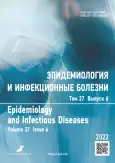Assessment of humoral immunity to SARS-CoV-2 among employees of medical organizations in the Republic of Tatarstan
- Authors: Minullin I.K.1, Eremeeva Z.G.1,2, Bogdanova E.V.1, Iskandarov I.R.2, Safina E.I.3
-
Affiliations:
- Republican Clinical Dermatology and Venereology Dispensary
- Kazan State Medical University
- City Polyclinic No. 3
- Issue: Vol 27, No 6 (2022)
- Pages: 327-332
- Section: Original study articles
- Submitted: 25.01.2023
- Accepted: 14.02.2023
- Published: 11.03.2023
- URL: https://rjeid.com/1560-9529/article/view/133716
- DOI: https://doi.org/10.17816/EID133716
- ID: 133716
Cite item
Abstract
BACKGROUND: Since the beginning of the new coronavirus infection pandemic, preventive measures aimed at combating the spread of the pathogen and preventing the development of severe forms of infection and deaths have improved. Despite the absence of a legally established, generally accepted post-vaccination protective value of antibodies to coronavirus, the study of the presence of antibodies and the determination of their amount in the blood serum of the vaccinated population continues.
AIM: This study presents the results of post-vaccination humoral immunity to SARS-CoV-2 in medical organizations regardless of their infectious disease history.
MATERIALS AND METHODS: This study involved employees of medical organizations of the State Autonomous Health Institution “Republican Clinical Dermatovenerologic Dispensary of the Ministry of Health of the Republic of Tatarstan named after Professor A.G. Ge” in Kazan and the State Autonomous Health Institution “City Polyclinic No. 3” in Naberezhnye Chelny. Three hundred ninety-three people (including 350 women) were vaccinated with the two-component vaccine GamCovidVac (Sputnik V). After a sufficient amount of time passed for the formation of an immune response, more than 21 days. The blood sera of these 393 people were examined for the determination of specific IgG to SARS-CoV-2 by enzyme immunoassay using the Vector-Best kit (Novosibirsk, Russia). Statistical analysis was performed using StatTech v.3.0.9 (developer, Stattech LLC, Russia).
RESULTS: The median age of the subjects was 47 (Q1–Q3: 39–59) years. The mean antibody titer level was 570 (Q1–Q3: 128–1150 BAU/ml). A correlation analysis of the relationship between titer levels and age at the time of vaccination was performed. According to the results, a weak direct relationship was established. There was no connection when assessing the antibody titer level dependence on vaccination duration after the second component at the time of checking the titers.
CONCLUSIONS: The ongoing pandemic of a new coronavirus infection with the emergence of new forms of the disease caused by other virus strains, the improvement in prevention methods, requires constant monitoring of the epidemiological situation with the study of the vaccine effectiveness, including the cellular level.
Keywords
Full Text
About the authors
Iskander K. Minullin
Republican Clinical Dermatology and Venereology Dispensary
Email: rkkvd@tatar.ru
ORCID iD: 0000-0003-3005-9938
SPIN-code: 6135-9573
MD
Russian Federation, KazanZhanna G. Eremeeva
Republican Clinical Dermatology and Venereology Dispensary; Kazan State Medical University
Author for correspondence.
Email: Z.Eremeeva@tatar.ru
ORCID iD: 0000-0003-2711-0624
SPIN-code: 9708-6788
MD, Cand. Sci. (Med.)
Russian Federation, Kazan; KazanElena V. Bogdanova
Republican Clinical Dermatology and Venereology Dispensary
Email: E.Bogdanova@tatar.ru
ORCID iD: 0000-0002-1278-3925
SPIN-code: 1934-6100
Russian Federation, Kazan
Ildar R. Iskandarov
Kazan State Medical University
Email: ildar.iskandarov@kazangmu.ru
ORCID iD: 0000-0002-4983-1150
SPIN-code: 7154-7420
MD, Cand. Sci. (Med.), Assistant Professor
Russian Federation, KazanElvira I. Safina
City Polyclinic No. 3
Email: Elvira.Ilgizarovna@tatar.ru
ORCID iD: 0000-0001-8789-178X
SPIN-code: 7712-4298
Russian Federation, Naberezhnye Chelny
References
- On the state of sanitary and epidemiological well-being of the population in the Republic of Tatarstan in 2021: state report. Kazan: Federal Service for Supervision of Consumer Rights Protection and Human Welfare; 2022. 359 p. (In Russ).
- Prikaz Ministerstva zdravookhraneniya Rossiyskoy Federatsii ot 06.12.2021 № 1122n “Ob utverzhdenii natsional’nogo kalendarya profilakticheskikh privivok, kalendarya profilakticheskikh privivok po epidemicheskim pokazaniyam i poryadka provedeniya profilakticheskikh privivok” [Order of the Ministry of Health of the Russian Federation dated December 6, 2021 No. 1122n “On approval of the national calendar of preventive vaccinations, the calendar of preventive vaccinations according to epidemic indications and the procedure for conducting preventive vaccinations”] [Internet]. Available from: http://publication.pravo.gov.ru/Document/View/0001202112200070 Accessed: Feb 16, 2023. (In Russ).
- Garmash YuYu, Ivanova DA, Borisov SE. Monitoring of antibodies to SARS-CoV-2 in workers of anti-tuberculosis hospital. Tuberculosis and Socially Significant Diseases. 2021;(1):21–31. (In Russ).
- Samodova OV, Kriger EA, Rogushina NL. Immunity to Vaccine-Preventable Infections in Healthcare Professionals Working in Infectious Diseases Hospitals. Epidemiology and Vaccinal Prevention. 2022;21(4):37–47. (In Russ). doi: 10.31631/2073-3046-2022-21-4-37-47
- Semenova EV, Pavlyuk VV, Uvarova MA, Ivanov AV. Features of humoral immunity after COVID-19. Medical Immunology (Russia). 2022;24(2):337–350. (In Russ). doi: 10.15789/1563-0625-FOH-2452
- Kombarova SYu, Aleshkin AV, Novikova LI. Features of the humoral response to infection, vaccination and revaccination in COVID-19. Bulletin of Experimental Biology and Medicine. 2022;173(6):719–725. (In Russ). doi: 10.47056/0365-9615-2022-173-6-719-725
- Andreev IV, Nechay KO, Andreev AI, et al. Post-vaccination and post-infection humoral immune response to the SARS-CoV-2 infection. Immunologiya. 2022;43(1):18–32. (In Russ). doi: 10.33029/0206-4952-2022-43-1-18-32
- Platonova TA, Golubkova AA, Sklyar MS, et al. On the Issue of Evaluating the Effectiveness of Vaccination of Employees of Medical Organizations against COVID-19. Epidemiology and Vaccinal Prevention. 2022;21(1):61–66. (In Russ). doi: 10.31631/2073-3046-2022-21-1-61-66
- Grigoruk SD, Lipskaya OV, Vinokurova TYu, et al. Evaluation of post-vaccination immunity to the new coronavirus infection SARS-COV-2 in oil and gas industry workers. Healthcare of Yugra: experience and innovations. 2022;(1):33–37. (In Russ).
- Platonova TA, Sklyar MS, Golubkova AA, et al. Assessment of specific T-cell immunity in patients who have been ill and vaccinated against COVID-19. Journal Infectology. 2022;14(1):96–104. (In Russ).
Supplementary files








